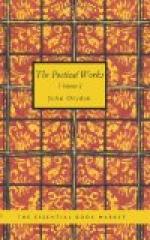25 For from all tempers he could service
draw;
The worth
of each, with its alloy, he knew;
And, as the confidant
of Nature, saw
How she
complexions did divide and brew.
26 Or he their single virtues did survey,
By intuition,
in his own large breast;
Where all the rich ideas
of them lay;
That were
the rule and measure to the rest.
27 When such heroic virtue Heaven sets
out,
The stars,
like commons, sullenly obey;
Because it drains them
when it comes about,
And therefore
is a tax they seldom pay.
28 From this high spring our foreign conquests
flow,
Which yet
more glorious triumphs do portend;
Since their commencement
to his arms they owe,
If springs
as high as fountains may ascend.
29 He made us freemen of the Continent,[11]
Whom Nature
did like captives treat before;
To nobler preys the
English lion sent,
And taught
him first in Belgian walks to roar.
30 That old unquestion’d pirate
of the land,
Proud Rome,
with dread the fate of Dunkirk heard;
And trembling wish’d
behind more Alps to stand,
Although
an Alexander[12] were her guard.
31 By his command we boldly cross’d
the line,
And bravely
fought where southern stars arise;
We traced the far-fetch’d
gold unto the mine,
And that
which bribed our fathers made our prize.
32 Such was our prince; yet own’d
a soul above
The highest
acts it could produce to show:
Thus poor mechanic arts
in public move,
Whilst the
deep secrets beyond practice go.
33 Nor died he when his ebbing fame went
less,
But when
fresh laurels courted him to live:
He seem’d but
to prevent some new success,
As if above
what triumphs earth could give.
34 His latest victories still thickest
came,
As near
the centre motion doth increase;
Till he, press’d
down by his own weighty name,
Did, like
the vestal,[13] under spoils decease.
35 But first the ocean as a tribute sent
The giant
prince of all her watery herd;
And the Isle, when her
protecting genius went,
Upon his
obsequies loud sighs[14] conferr’d.
36 No civil broils have since his death
arose,
But faction
now by habit does obey;
And wars have that respect
for his repose,
As winds
for halcyons, when they breed at sea.
37 His ashes in a peaceful urn[15] shall
rest;
His name
a great example stands, to show
How strangely high endeavours
may be blest,
Where piety
and valour jointly go.
* * * * *
FOOTNOTES:
[Footnote 5: ‘Sacred eagle:’ the Romans let fly an eagle from the pile of a dead Emperor.]




